IOSCHS One-Day National Seminar on “Islam Mein Dhikr ka Mukhtalif Zaviyon se Mutale’aa”
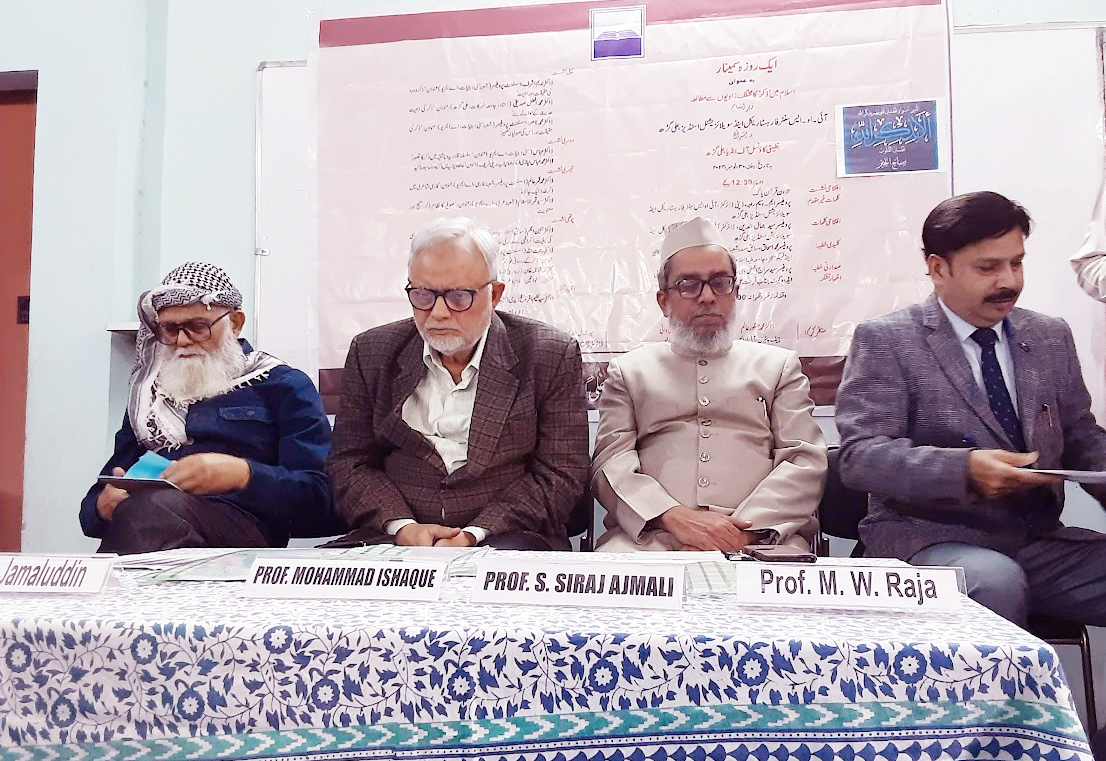
IOSCHS One-Day National Seminar on “Islam Mein Dhikr ka Mukhtalif Zaviyon se Mutale’aa”
Aligarh: IOS Centre for Historical and Civilisational Studies (IOSCHS) organised one-day national seminar on Islam mein Dhikr ka Mukhtalif Zaviyon se Mutale’aa on November 30, 2024 at Aligarh.
The inaugural session started with the recitation of a few verses from the Holy Qur’an by Aalima Gulfishan from the Qur’anic School, Aligarh. Professor M. Waseem Raja (CAS, Dept. of History, Aligarh Muslim University) & Joint Director, IOSCHCS extended a warm welcome to Professor Syed Siraj Ajmali (CAS, Dept. of Urdu, AMU) who was in the Chair, and the delegates and members of audience. He briefly discussed about the aims and objective of the IOSCHCS and informed that it is a newly launched research-based organisation, an affiliate of the Institute of Objective Studies, New Delhi. He further presented a brief profile of the Centre.
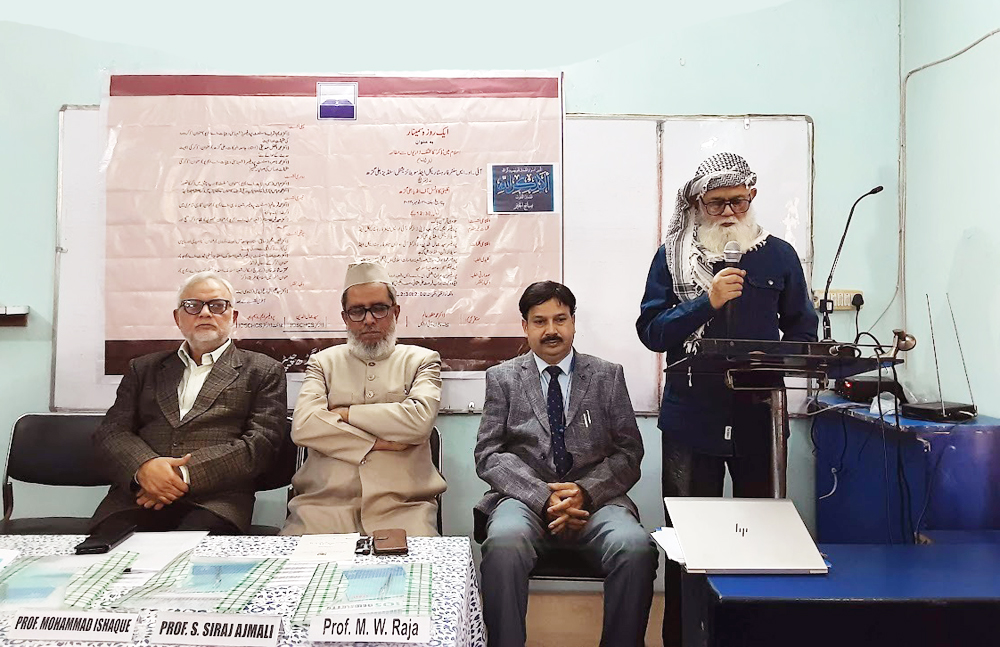
Professor Syed Jamaluddin, Director, IOSCHS, highlighted the center’s commitment to fostering historical, civilisational and spiritual studies, crediting the leadership of Dr. Mohammad Manzoor Alam, Founding Chairman and Chief Patron of the IOS, and Professor M. Afzal Wani, Chairman of the IOS, and, for their support.
Introducing the theme of the one-day national seminar, he said that in sufi parlance, dhikr (remembrance of Allah) occupies a high place. Each Sufi order prescribes to its followers certain adhkaar for different times in a day to glorify Allah, especially His ninety nine beautiful epithets (asma’-e husna). He shared with the audience his experience of an assembly of dhikr he attended at a Shaazli Khanqah in Amman (Jordan), presided over by Shaikh Nuh Hamim Cellar. He then, told that once a Sudanese Professor of Shari’ah at Al-Bayt University in Amman, Jordan asked him what was the most important feature of the Qadiriyya Sufi order to which he replied it was dhikr. Professor Jamaluddin then told the learned audience that the Khanqah-e-Barkaatiya of Marehra Shareef to which he belongs prescribes to its disciples a daily tasbih, called Panj-e-Ganj-e-Qadiriyya, Uttar Pradesh, India (five Qadiri treasures) to be repeated after each of the five obligatory prayers.
Picking up from Professor Syed Jamaluddin, Professor M. Waseem Raja, emphasised the importance of Dhikr in Islamic worship providing the following outline of the theme of the national seminar:
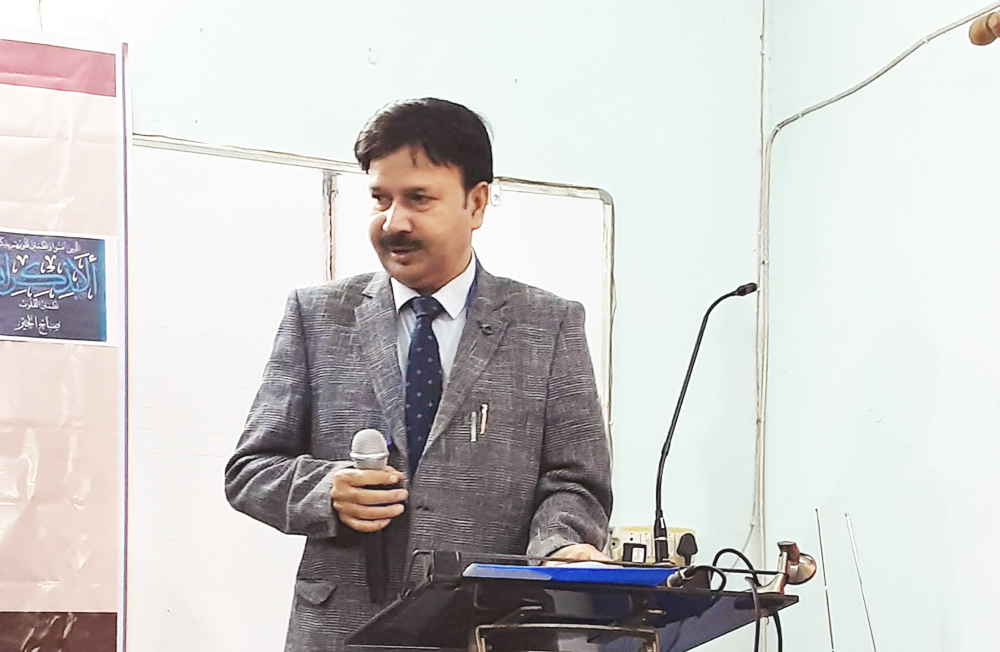
Professor Raja began with the definition and significance of Dhikr. He said that Dhikr (Arabic: ذِكْر) literally means ‘remembrance’ or ‘mention’ and involves the recitation of devotional prayers or phrases to remember Allah. It can be performed silently, within the mind, or aloud, often involving physical movements like swaying, dancing, or whirling, particularly in Sufi practices. The seminar highlighted the Hadith stating that reciting “Subhan Allah wa bihamdihi” (Glory be to Allah and with His praise) 100 times a day forgives all sins, even if they are as vast as the foam of the sea. He discussed specific Sufi practices, such as the Naqshbandiyya order’s adhkaar (remembrances) and the Tariqa-e-Adhkaar (method of remembrances), which involve rhythmic chanting and physical exertions like stamping and grunting to create a primal, communal sound. A notable example was the description of men swaying in unison, grunting from the abdomen and throat, while one voice rises to sing variants of Allah’s names. He emphasised the Qur’anic foundation of ‘Dhikr’, with references to its spiritual weight. For instance, Prophet Moosa (A.S.) stated that “La ilaha illallah” outweighs the seven heavens and earth. The best dhikr (kalimah tayyibah) is “La ilaha illallah”, and the best supplication is ‘Alhamdulillah’. A narration from Muhammad ibn Ali al-Baqir, the fifth Sunni-Shia Imam, was cited, stating that Allah has not been worshipped with anything better than the Tasbih of Hazrat Fatima Zahra R.A. (a specific form of dhikr involving the recitation of Subhan Allah, Alhamdulillah, and Allahu Akbar. If a better practice existed, Allah would have granted it to Hazrat Fatima (R.A.). He explained how dhikr is coupled with physical movements in some traditions, such as dancing and whirling, to induce ecstatic trances, a practice often associated with the Mevlevi Order (Whirling Dervishes), though not explicitly mentioned in the seminar.
Professor Raja added that ‘dhikr’ brings peace to our souls and scholars from different disciples who have gathered at the Centre would reflect from different angles how dhikr creates a positive attitude and changes the whole perspective towards life.
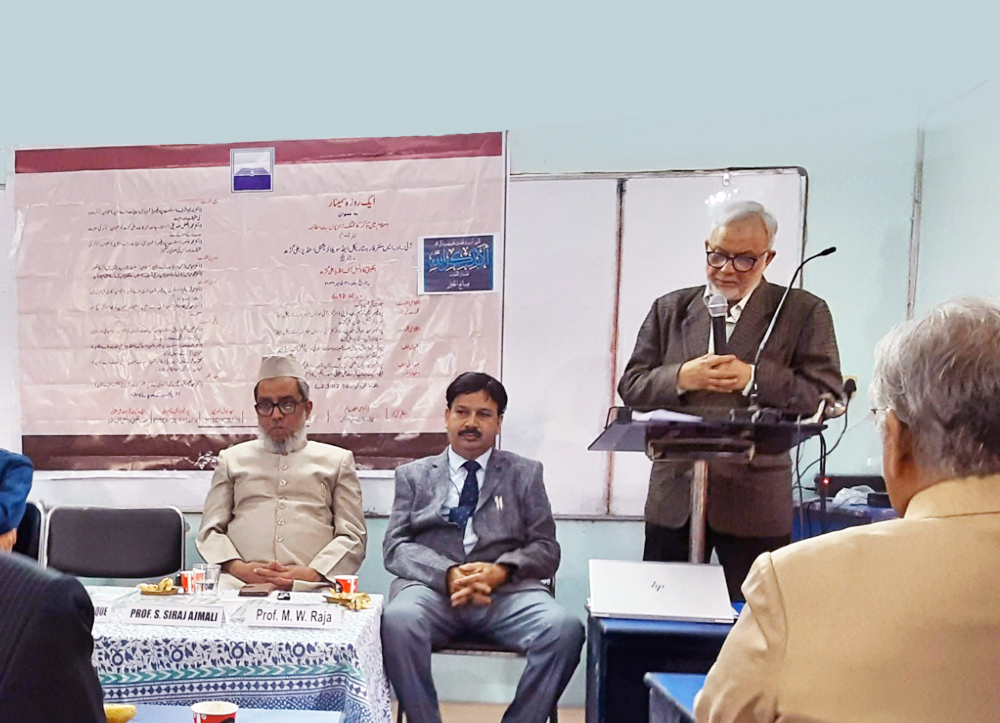
Following the above presentations by Professor Jamaluddin and Professor Raja, Professor Mohammad Ishaque, Formerly Head, Dept. of Islamic Studies and Dean, Faculty of Humanities & Languages, Jamia Millia Islamia, New Delhi, a distinguished scholar of Islam with deep insights into Islamic mysticism was requested to deliver the keynote address on ‘The Concept of Dhikr in the light of the Qur’an, Sunnah and the Traditions of the Righteous’. He delivered a very comprehensive address embellished with Qur’anic verses and the ahadith. A summary of his address is being reproduced below:
He explained the term dhikr (remembrance) and its significance in Islam. He mentioned that the Qur’an is referred to as ‘Al-Dhikr’, meaning it serves as a reminder to all of humanity. The Qur’an is described as the clearest reminder of what is inherently embedded in human nature and the guidance that Allah has provided through His prophets. It also warns of the far-reaching consequences in this world and the hereafter for denying this guidance. The verse "So remember Me; I will remember you. And be grateful to Me and do not deny Me." This verse is seen as a covenant between Allah and humans, emphasising the importance of the remembrance, gratitude, and piety as a means of purification. The text advises seeking help through patience and prayer, noting that patience is required in times of difficulty, which in turn invites remembrance of God and tests the truth of one's faith. Prayer is described as the embodiment of divine remembrance and gratitude. The text stresses the importance of remembering Allah's blessings and being grateful, warning that neglecting Al-Dhikr leads to missing out on the highest happiness for which humans were created. The Qur’an, referred to as Al-Dhikr, is to be pondered over, as highlighted in Surah Muhammad of the Qur’an "Do they not then reflect on the Qur’an, or are there locks upon their hearts?" The Qur’an is portrayed as the key to awakening and enlivening hearts. Those who undervalue this book find their hearts rusted and closed off by worldly desires, envy, malice, stinginess, fear of death, cowardice, hypocrisy, and arrogance. The remedy for these ailments is turning back to Al-Dhikr Al-Hakim (the Wise Reminder). He also focused on dhikr (remembrance) as practiced by the servants of Allah. Professor Ishaque highlighted the beautiful combination of actions and remembrances in acts of worship. For example, in the prayer (Salah), there is a blend of physical actions such as raising the hands (Raf' al-Yadain), standing (Qiyam), bowing (Ruku'), standing after bowing (Qaumah), prostration (Sujud), sitting between prostrations (Jalsah), and the final sitting (Qa'dah), along with verbal remembrances like Allahu Akbar, recitation of Surah Al-Fatiha and other verses of the Qur’an, Sami' Allahu liman Hamidah, Rabbana lakal Hamd, and As-salamu Alaikum wa Rahmatullah. These prescribed remembrances include glorification, praise, supplication, and intimate conversations with Allah, forming an inseparable part of the prayer. The purpose is to keep the heart alive with the remembrance of Allah. In verse 36 of Surah Az-Zukhruf, it is stated: "And whoever turns away from the remembrance of the Most Merciful, We appoint for him a devil, and he is to him a companion." This verse mentions the consequence of turning away from the remembrance of Allah, which is the imposition of a devil as a companion. In his address Professor Ishaque highlighted the fundamental importance of Dhikr (remembrance of Allah) in Sufi traditions. A particular verse from Surah Ar-Ra'd, verse 28, is often cited within Sufi circles regarding the significance of divine remembrance: "Those who believe, and whose hearts find their rest in the remembrance of Allah for, verily, in the remembrance of Allah [men’s] hearts do find their rest”. This verse emphasises that true tranquility and peace of heart are achieved through the remembrance of Allah. The learned Islamic scholar concluded by mentioning how the Prophet Muhammad (PBUH) exemplified unparalleled practical model of dhikr for humanity, demonstrating its importance and impact through his actions.
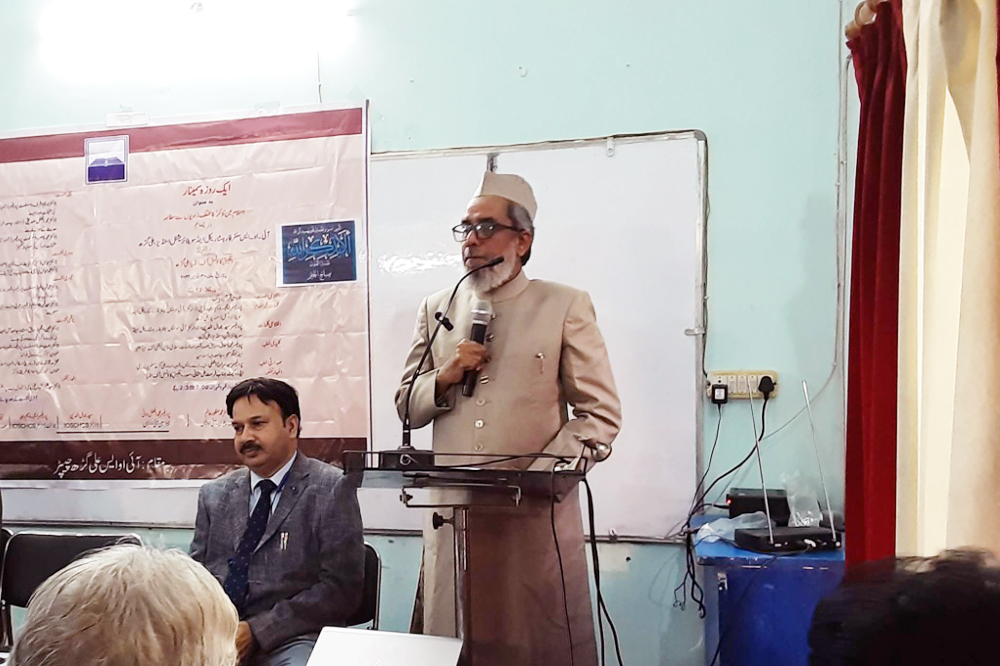
In his presidential address, Professor Syed Siraj Ajmali (CAS, Department of Urdu, Aligarh Muslim University) shared with the audience the dhikr assemblies which are held at Daira Shah Ajmal in Allahabad. He described various adhkaar practiced by the Mashaikh of the Daira. He focused on how the dhikr assemblies inspire the disciples to connect with Allah and create a state of ecstasy (wajd). Professor Ajmali explained at length the inner meaning of various adhkaar, emphasising the connectivity between the Creator and the creature. He said that dhikr brings peace and harmony to one’s life. He further elaborated on the cultural and literary dimensions of dhikr, particularly its expression in Urdu poetry and Islamic literature. He also discussed the physical aspects of dhikr, such as the rhythmic movements and chants practiced by Sufi orders, which create a primal and, communal experience of devotion.
Inaugural Session ended with a vote of thanks by Professor Waseem Raja. He then invited the delegates and all attendees to lunch which was served by courtesy of Mr. Nadir Jamal, an alumnus of Jamia Millia Islamia, New Delhi.
Post lunch, Professor Raja introduced the seminar delegates, heralding key discussions and themes by the distinguished speakers which focused on the multifaceted nature of dhikr in Islam, exploring its theological, spiritual, and practical dimensions. Scholars who contributed to the proceedings of the seminar were:
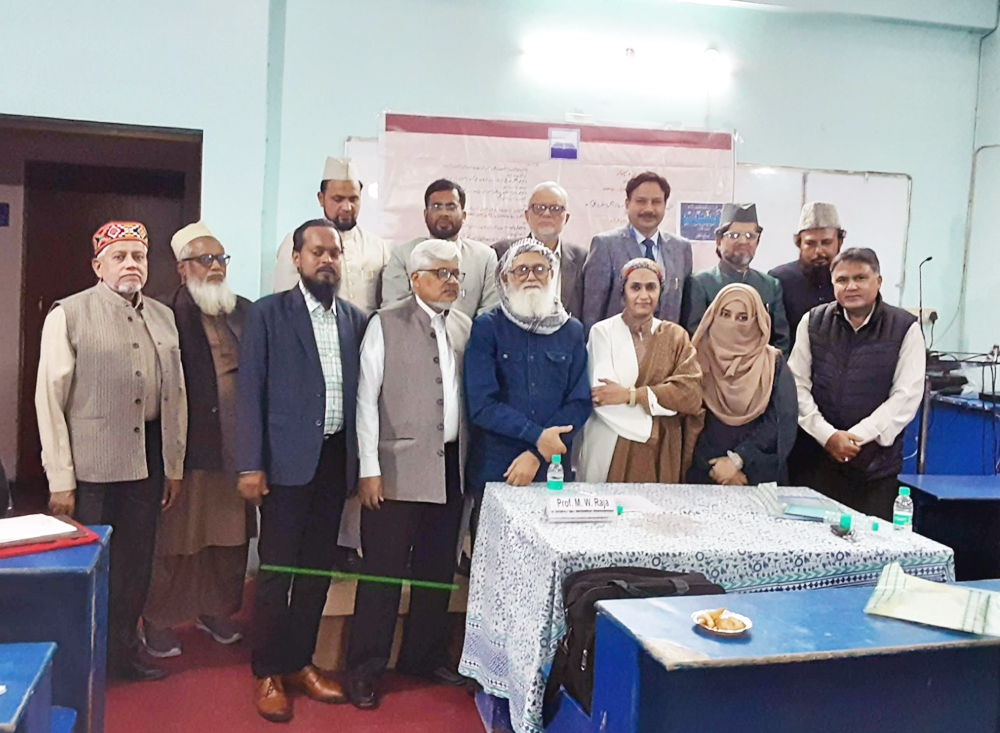
Dr. Nadeem Ashraf (Assistant Professor, Department of Sunni Theology, AMU; Topic: ‘Dhikr-o-Wird ki Haqiqat wa Amiyat aur Ulama-e-Kiram ka Nuqta-e-Nazar’); Dr. Muhammad Nasir (Assistant Professor, Department of Sunni Theology, AMU; Topic: ‘Dhikr ki Sufiyana Tafhim’); Dr. M Afzal Siddiqui (Jamia Al-Barkaat, Aligarh; Topic: ‘Dhikr ki Ahmiyat Ahadith ke Hawale se’); Dr. M. Abbas (Department of Shia Theology, AMU; Topic: ‘Silsila-e-Qadiriyya wa Chishtiya mein Dhikr ka Tasawwur’); Dr. Abbas Niyazi (Khanwad-e-Niyaziya, Bareli Shareef; Topic: ‘Khanqah Niyaziya mein Dhikr ka Ahtamam aur Takid’); Dr. Zabeen Anjum (Former Faculty at Jamia al-Bait, Jordan; Topic: ‘Na-ummidi aur Mayusi ki Kaifiyat Dhikr-e-Ilahi se Kaise Dur ki Jaaye’); Dr. Rahmatullah (Department of Islamic Studies, AMU; Topic: ‘Dhikr ke Roohani Fawaaid’) and Ms Shumayla Khan (Research Scholar in the Dept. of Islamic Studies, AMU; Topic: Khawateen-i-Islam ka Tareeqa-i-Dhikr’) presented their respective papers on different aspects of the Dhikr relevant to the broad theme of the seminar.
Janab Ahmad Javed, Senior Journalist, Dr. Mohammad Qamar (Asstt. Professor, Dept. of Persian, AMU) and Dr. Syed Qamrul Islam (Dept. of Arabic) could not participate in the seminar, but their contributions on ‘Nafs, Qalb aur Dhikr’; ‘Farsi Shaa‘iri mein Dhikr-e-Khuda’; and ‘Sufiya ka Nizam-e-Dhikr: Manhaj aur M‘anaviyat’ respectively will be adorned in the IOSCHCS’s forthcoming Volume on Dhikr.
Dr. Syed Kaleem Afrough Zaidi, Associate Professor at Civil Engineering Section, University Polytechnic, AMU, who hails from a khanqah, compared the whole academic event and in the end, extended the vote of thanks.
A publication based on the proceedings of the said seminar would be compiled to preserve the insights shared at the seminar and make them accessible to a wider audience.
Go Back